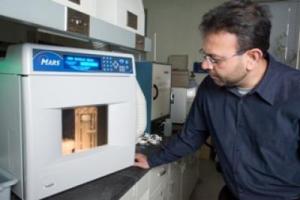Somenath Mitra, a professor from NJIT, has developed a new desalination process using carbon nanotubes. This process stops carbon nanotubes in membrane pores to form new architecture for the membrane distillation process. Thermal distillation and reverse osmosis are the usual desalination methods.
The existing membrane distillation process is very costly to produce drinking water in countries and municipalities that require drinking water. This process is used only in industries, where waste heat is available for free. But, this new process may help in bringing clean water to the people.
 This is NJIT professor Somenath Mitra working in his lab.
This is NJIT professor Somenath Mitra working in his lab.
The professor and his research team summarized this new process in "Water Desalination Using Carbon Nanotube Enhanced Membrane Distillation" in the recent issue of the American Chemistry Society's Applied Materials & Interfaces.
Membrane distillation is a clean, safe water refining process wherein heated salt water passes through a hollow fiber, a tube-like membrane. In this process only water vapor is allowed to pass through the walls of the hollow tube and not liquid. When the system is working, drinking water comes out from water vapor and moves to the cool side and waste salt water passes through fiber. It can be carried out at 60-90ºC.
But membrane distillation is not trouble free and is hard to make it work properly. The major challenge is to find suitable membranes that support high water vapor flux.
Mitra's new technique immobilizes nanotubes in pores to create a better membrane. It not only increases vapor penetration but also stops blockage in membrane pores. It can work at lower temperatures, higher flow rate and higher salt concentration.
Source: http://www.njit.edu/